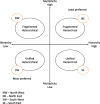Funding models and medical dominance in interdisciplinary primary care teams: qualitative evidence from three Canadian provinces
- PMID: 30103754
- PMCID: PMC6090795
- DOI: 10.1186/s12960-018-0299-3
Funding models and medical dominance in interdisciplinary primary care teams: qualitative evidence from three Canadian provinces
Abstract
Background: Primary care in Canada is the first point of entry for patients needing specialized services, the fundamental source of care for those living with chronic illness, and the main supplier of preventive services. Increased pressures on the system lead to changes such as an increased reliance on interdisciplinary teams, which are advocated to have numerous advantages. The functioning of teams largely depends on inter-professional relationships that can be supported or strained by the financial arrangements within teams. We assess which types of financial environments perpetuate and which reduce the challenge of medical dominance.
Methods: Using qualitative interview data from 19 interdisciplinary teams/networks in three Canadian provinces, as well as related policy documents, we develop a typology of financial environments along two dimensions, financial hierarchy and multiplicity of funding sources. A financial hierarchy is created when the incomes of some providers are a function of the incomes of other providers. A multiplicity of funding sources is created when team funding is provided by several funders and a team faces multiple lines of accountability.
Results: We argue that medical dominance is perpetuated with higher degrees of financial hierarchy and higher degrees of multiplicity. We show that the financial environments created in the three provinces have not supported a reduction in medical dominance. The longstanding Community Health Centre model, however, displays the least financial hierarchy and the least multiplicity-an environment least fertile for medical dominance.
Conclusions: The functioning of interdisciplinary primary care teams can be negatively affected by the unique positioning of the medical profession. The financial environment created for teams is an important consideration in policy development, as it plays an important role in establishing inter-professional relationships. Policies that reduce financial hierarchies and funding multiplicities are optimal in this regard.
Conflict of interest statement
W. Dominika Wranik is an associate professor in the School of Public Administration at Dalhousie University, cross appointed with the Department of Community Health and Epidemiology, and with the PhD Health Program. She obtained her PhD in Economics from the University of Manitoba. Her research focuses on the application of economic knowledge to health policies and services, specifically the implications of financial incentives for the delivery of health services.
Susan Haydt is a research facilitator in the Faculty of Management at Dalhousie University. She obtained her PhD in Sociology from Dalhousie University. Her research interests are in the sociology of professions and the politics of primary care reform and interdisciplinary primary care teams.
The study protocol, including recruitment strategies, and project information and consent forms provided to respondents were reviewed and approved by the following:
Health Research Ethics Board of Alberta—Community Health Committee
University of Manitoba—Bannatyne Campus Health Research Ethics Board
Capital Health Research Ethics Board
Colchester East Hants Research Ethics Board
Guysborough Antigonish Strait Health Authority Research Ethics Board
Pictou County Health Authority Research Ethics Board
South Shore Health Ethics Committee
All respondents signed a consent to participate in the study, including a consent to publish anonymized results.
The manuscript contains anonymized quotations from individual interview respondents. All respondents signed informed consent forms consenting to the potential publication of quotations.
The authors declare that they have no competing interests.
Springer Nature remains neutral with regard to jurisdictional claims in published maps and institutional affiliations.
Figures
References
-
- Ferrante JM, Balasubramanian BA, Hudson SV, Crabtree BF. Principles of the patient-centered medical home and preventive services delivery. Ann Fam Med. 2010;8(2):108–16. http://psycnet.apa.org/record/2010-06447-003. - PMC - PubMed
-
- Khan S, McIntosh C, Sanmartin C, Watson D, Leeb K. Primary health care teams and their impact on processes and outcomes of care. Ottawa: Statistics Canada; 2008. Available at: https://www150.statcan.gc.ca/n1/pub/82-622-x/82-622-x2008002-eng.pdf. Accessed 17 July 2018.
Publication types
MeSH terms
Grants and funding
LinkOut - more resources
Full Text Sources
Other Literature Sources
Medical



